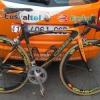Fellow Cyclists. I've read some of your experiences in regards to resveratrol supplementation. I'm curious to learn more. I'm a USA Level II Cycling Coach with athletes spread about the country. I keep close tracks of their training, nutrition and supplementation routines.
Recently, I had two team mates bring to my attention their usage of resveratrol. My first concern was to ensure they weren't in violation of any USDA Doping Controls. Secondly, I wanted to ensure the safety of their supplementation. I'm fortunate here, because I have advanced Physiology Degrees and retain access to most all scientific publications. I've previously vetted their use of bulk Quercetin and FRS Energy products.
From my searching, it appears that most do not believe significant mitochondrial biogenesis is possible at lower dosages to affect V02Max or V02@CP30 (Critical Power 30 minutes). I accepted from my athletes that there was some biogenesis occurring, because both were in periodization phases that would not typically result in strong physiological gains they obtained. After doing my reading, they offered a 60 day supply for my testing of BF 500mg - Trans-resveratrol 98+% (RSV98). While they had been taking 1.5-2.0gms per day, I opted for a single 500mg dose accompanied by post workout meal. After 45 days, I can say I've had big gains, not reflective of any other training period since 1982-83 as a 24yo Cat II Racer. Hematocrit, Hemoglobin, and Cardiac Output remain unchanged from pre-RSV98 supplementation. however, the increased peripheral changes at the muscle are obvious, but still undocumented by biopsy.
Pleasantly surprised with my own results, I've order some un-capped micronized resveratrol (M98) from RevGenetics to continue my supplementation. Two questions remain:
1. Do I stay at 300-600mg with micronized, or ramp up for better results? I can't put my finger on the empirical research that points directly at the answer, so I trust some of you cyclists will have strong anecdotal experiences. My intent is to continue my pre-workout quercetin supplementation, and use M98 for post-workout recovery periods.
2. One dose, or split multiple doses 4-5 hours apart? One within 30 minutes after WO (10 minutes sublingual with whey/carb recovery drink to chase), and another dose five hours post-workout? Peak, or sustained for mitochondrial biogenesis?
I'm hoping this supplementation will springboard some altitude training over the next few weeks. I train 10-16 hours/week on average depending on periodization cycle. Most all my workouts are concluded by 0900 on weekdays and 1100 on weekends.
Recommendations, observations and insight welcome.












































